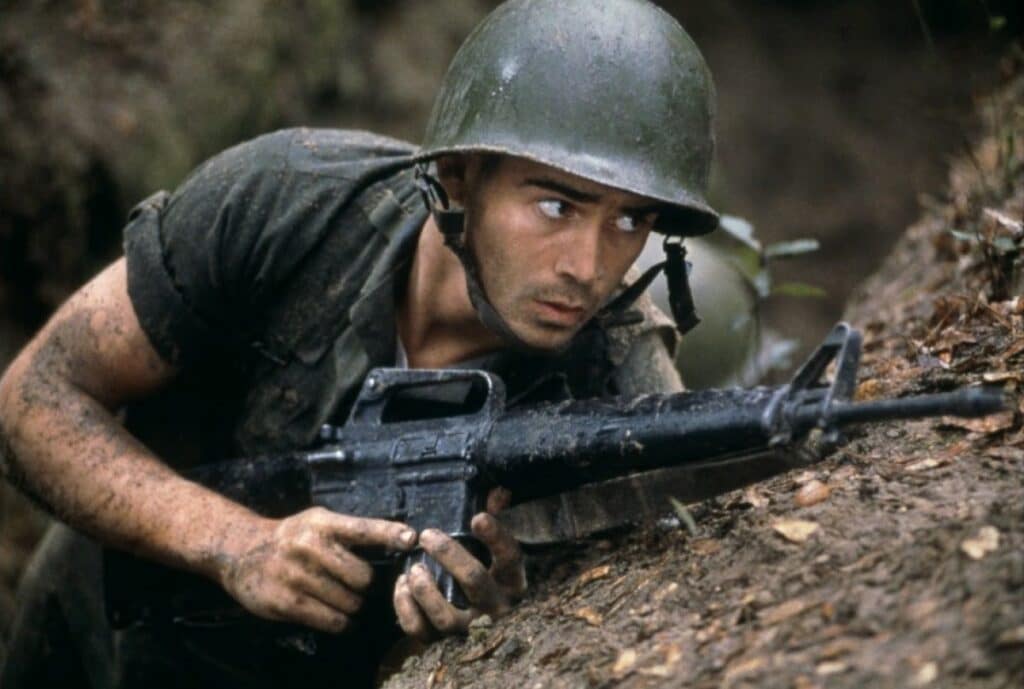Read also:
How to Watch FX Live Without CableHow To Watch AMC Without CableHow to Watch ABC Without CableHow to Watch Paramount Network Without Cable
At the turn of the century, Irish actor Colin Farrell was discovered in his early 20s — not by Steven Spielberg in Minority Report, but by Joel Schumacher in Tigerland. Schumacher’s film came out in 2000, with Farrell in the lead at the age of 24, putting him near 22/23 when they filmed the gritty war drama. It’s a referendum on war, early male rage, and the dichotomies that continue to persist within the armed forces. It’s also one of Schumacher’s best, a highlight in a comparatively spotty filmography.
Following a group of soldiers in the weeks before they’re sent off to Vietnam in 1971, Tigerland sees Schumacher focusing his lens squarely on Farrell, a fresh actor, one that audiences hadn’t seen yet, and didn’t end up seeing in this film either. Made for around $10 million, the film grossed less than $150,000 at the box office, putting it into the category of Schumacher box office failures, regardless of largely positive critical reviews. In Roger Ebert’s top 10 films of 2000 article, he even mentioned Tigerland in his “Valued” category, which makes him one of the few to actually watch the film that year.
Celebrating its 20th anniversary last month in June, the film gives Farrell an early calling card, in which he puts his Irish accent to good use, speaking with an Irish-Texan twang as an American soldier drafted into a war he opposes with unwavering annoyance. Schumacher’s film differs from the war classics because its characters haven’t actually entered the shit yet: they’re only preparing for it. It’s a look at the pain of pre-war preparation, including the nerves, the regrets, and the anger each man is dealing with, or shoving to the back of his mind.

Featuring a cattle call of young and talented actors, Tigerland stars Farrell, Matthew Davis (pre-Legally Blonde), Clifton Collins Jr., Shea Whigham, and even Michael Shannon as someone who shocks privates’ private parts when they’re out of line. But this is Farrell’s vehicle, and one he drives with manic, reckless youth, and he shines because of this undeterred youth channeled by Schumacher in a fantastic performance in his first leading role.
Farrell’s character, Roland Bozz, is an archetypal bad boy, bending the rules and following his own set of laws. His friend and fellow private, Jim Paxton (Davis), is a writer and volunteer in this war, patriotic and not attempting to ruffle any feathers. These two are drawn together by a few things, including an initial night out with some local women and early, same-room sex scenes. Though their friendship isn’t the propeller of the film, it does highlight a bit of bonding-through-hardship, a male companionship that exists through necessity.
Joining their troop is Miter (Clifton) and Wilson (Whigham in a villainous, bigoted role), with all of the men stumbling through their training before supposed shipping to Vietnam. All of the men, boys actually, have different reasons for being there, yet they feel stuck in an endless tirade of profanities, in abundance in the script by Ross Klavan and Michael McGruther. The words used in Tigerland aren’t for the light-hearted, and many of them would make any person shutter, especially if they’re being screamed six inches from your face. The training and intensity mirror the real Tigerland of the ’60s and ’70s, along with the heat and exhaustion new soldiers felt in Fort Polk, Louisiana.
Tigerland shows Schumacher was willing to explore different kinds of stories — ones far grittier, darker, and more violent than his previous filmography.
Tigerland keeps a tint of haziness throughout its 100-minute runtime, a subtly gorgeous setting for such frustration and violence, in which boys train how to kill others living halfway across the globe. As with many Schumacher films, a specific look is present in each frame, using a mix of long and wide shots juxtaposed with close-ups to show the suffocating nature of these situations.
As the plot progresses, Bozz grows in popularity, becoming the squad leader and finding loopholes for several privates to go home and leave this awful place behind. He consistently attempts to put others ahead of himself, though keeping a level of selfishness and aloofness the entire time they are in training. Farrell conveys all of this with a series of looks, smirks, and almost-frantic decisions, ultimately protecting those around him instead of escaping himself. And by the end of the film, the majority of his counterparts won’t be going to Vietnam with him. He’s alone, exactly as he came.
Underseen and somewhat forgotten, Tigerland shows Schumacher was willing to explore different kinds of stories — ones far grittier, darker, and more violent than his previous filmography, but still looking at the impact that situations can have on youth masculinity.
Injected with fragile testosterone, Farrell’s breakout film finds a group of actors in early-yet-fine form, all portraying differing levels of anger towards the government, the war, the world, and one another. It shifts between fights (both gun and fist) and tender conversations between people generally unhappy with their decision (or non-decision) to be a part of this war.
Tigerland firmly deserves to be in the upper echelon of Schumacher’s filmography. In classic Schumacher fashion, it’s another chapter of the filmmaker taking chances on both actors and stories, showing more sides of the way young men deal with the world around them.